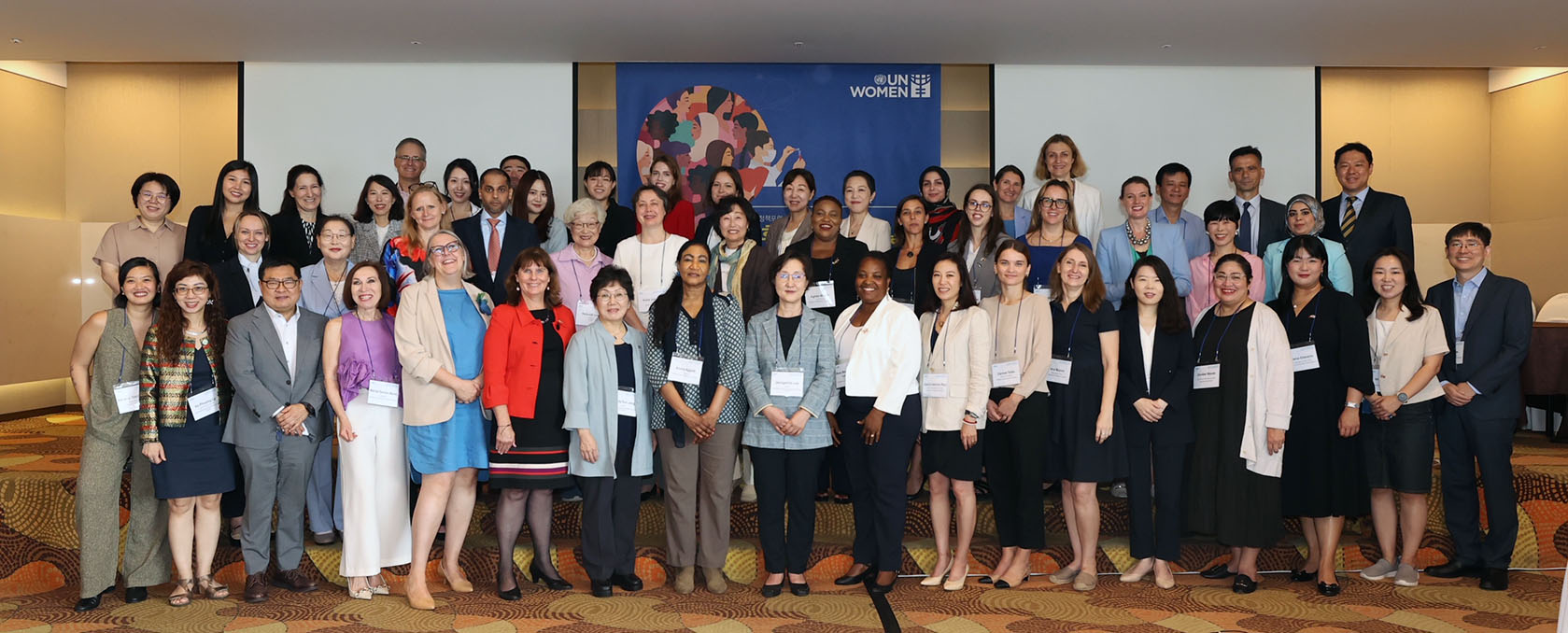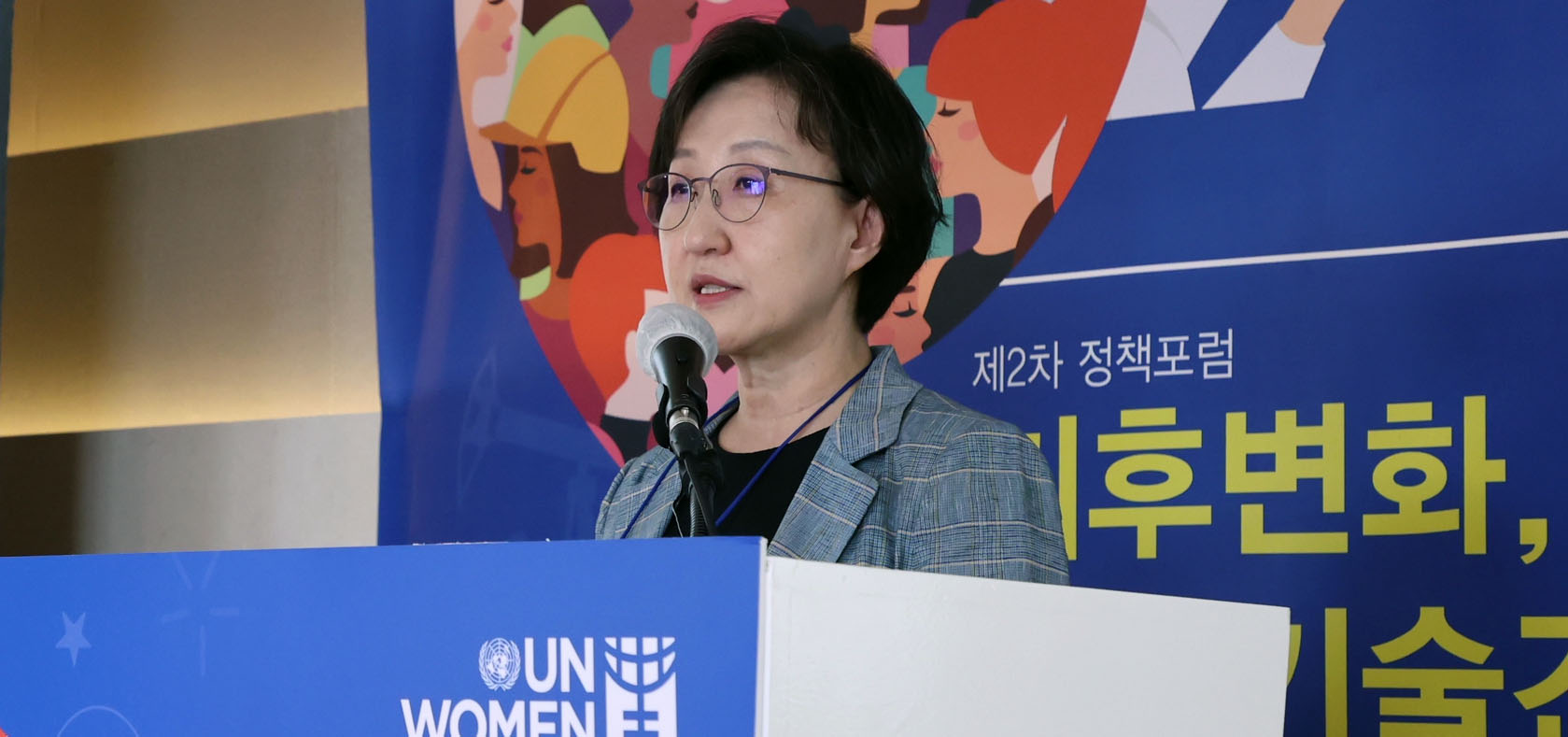[Press release]

Participants from embassies based in Seoul, international organisations, and private sectors are taking a group photo at the 'Second Policy Forum on Exploring Climate Change, Gender and Technology Nexus' hosted by the UN Women Centre of Excellence for Gender Equality. Photo: UN Women/Kwanju Kim
English | 한국어
Seoul, Republic of Korea — On 5 September 2023, the UN Women Centre of Excellence for Gender Equality organized a policy forum to discuss the science, technology and the gendered dimensions of climate change.
Over 70 government officials, academics, civil society organizations, diplomatic missions, and UN experts participated in the second policy forum titled "Integrated Approaches to Climate Change, Gender, and Science and Technology" held by the Centre at the Seoul President Hotel.
At the event, participants emphasized how climate change is closely linked to gender issues. Research has shown that climate change significantly affects women's lives, health, and safety. This is particularly evident in the agricultural sector where women have a higher representation. According to a 2022 report from the UN Refugee Agency, the mortality rate among women and children due to climate-induced natural disasters is 14 times higher compared to men.
Maria Holtsberg, Regional Humanitarian and Disaster Risk Reduction Advisor at UN Women Regional Office for Asia and the Pacific delivered a keynote speech that shed light on the impact of climate change on exacerbating gender inequality. With her insightful presentation, she effectively outlined the intricate connections between climate change and gender, laying the foundations for ensuing discussions.
Zonibel Woods, a senior social development specialist at the Asian Development Bank, emphasized the role of women and girls as agents of change in their communities. "It is important for development partners, governments, and civil society organizations to give women opportunities to participate and lead in climate resilience programmes in support of sustainable development."
The forum also reviewed innovative climate technologies and strategies that incorporate gender perspectives into climate action. Park Jung Sook, Secretary General of the World Smart City Organisation (WeGo), presented cases from WeGo member cities that illustrated the impact of the climate crisis on women and girls in areas such as information technology, transportation, waste management, and healthcare. She also suggested the need for technology development to make public services related to disasters more accessible to women.
The forum emphasized the importance of women’s participation and leadership in the development of climate technology. According to UNESCO, as of 2019, women constituted only 29.3 per cent of graduates in STEM (Science, Technology, Engineering, and Mathematics) fields worldwide. While a gender-inclusive perspective is crucial in climate technology development, low women's participation remains a challenge.
Helena McLoed, Deputy Director-General and Head of Green Growth Planning and Implementation at the Global Green Growth Institute emphasized that climate crisis response policies must prioritize women's participation, leadership, and representation. She highlighted that neglecting these aspects could lead to the exclusion of women's voices and the infringement upon their rights.
An exemplary case shared was the Empower programme jointly implemented by UN Women, the UN Environment Programme, and the ‘Help for Indigenous Value Promotion and Sustainable Development’ organisation in Viet Nam. Nguyen Van An, Director of Help for Indigenous Value Promotion and Sustainable Environment, presented how women farmers in underserved regions of Viet Nam have benefitted from renewable energy technologies, with over 20,000 women benefiting from the enabling economic activities.

Jeongshim Lee, director of the UN Women Centre of Excellence for Gender Equality, is opening the ‘Second Policy Forum on Exploring Climate Change, Gender and Technology Nexus.’ Photo: UN Women/Kwanju Kim
Jeongshim Lee, Director of UN Women Centre of Excellence for Gender Equality, remarked that “while climate change, gender, and technology are all critical agendas, the attempt to integrate these three topics is a first in Korea.” She further reaffirmed the “Centre’s commitment to fostering new discussions by exploring the interconnectedness between climate change, gender, and science and technology.”
Anne Juepner, Director of the United Nations Development Programme Seoul Policy Centre, said “There is an urgent need to create an enabling environment that empowers women’s active engagement in decision-making processes pertaining to climate adaptation and mitigation.”
Heisook Lee, President of GISTeR, moderator of the event, noted that “the forum provided an opportunity to examine climate change from a gender perspective and confirm that technology and innovation are effective ways to mitigate the issues between climate change and gender,” and expressed hopes for “more active discussions on addressing climate change from a gender perspective in the future.”
The Centre regularly hosts policy forums on globally relevant topics. The first forum, held in April, focused on digital innovation and technological changes in the context of gender equality, following the conclusions of the 67th session of the United Nations Commission on the Status of Women (CSW67). The Centre will continue to host policy forums to discuss gender perspectives on a regular basis.
Media inquiries:
A.J. Lee, External Relations Specialist, [ Click to reveal ]
About UN Women
UN Women is the United Nations entity dedicated to gender equality and the empowerment of women. A global champion for women and girls, UN Women was established to accelerate progress on meeting their needs worldwide. UN Women is delivering programmes, policies and standards that uphold women’s human rights and ensure that every woman and girl lives up to her full potential.

